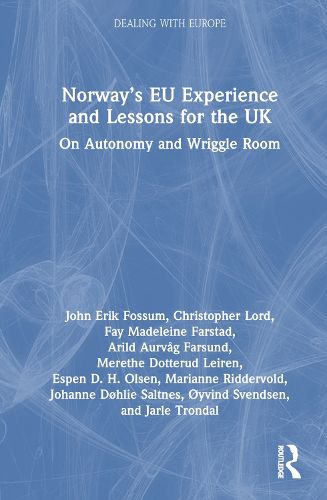Readings Newsletter
Become a Readings Member to make your shopping experience even easier.
Sign in or sign up for free!
You’re not far away from qualifying for FREE standard shipping within Australia
You’ve qualified for FREE standard shipping within Australia
The cart is loading…






This book examines Norway's affiliation to the EU and systematically assesses the potential suitability of this arrangement for the UK as a viable EU affiliation post-Brexit.
Framing the book within the framework of the broader European context, the authors ask how much autonomy and room to manoeuvre tightly integrated non-member states have under this arrangement. They present an in-depth assessment of Norway's close EU affiliation and provide insight into what this may reveal to us about the post-Brexit European political order. The book's analytical framework centred on autonomy under complex interdependence has relevance well beyond the confines of the Norway case. This includes the UK, not least since the EU-UK Trade and Cooperation Agreement (TCA) leaves considerable uncertainty. It contains transitory elements; there will be implementation reviews, and there may be many more bilateral and multilateral agreements before the trade relationship is fully defined.
This book will be of key interest to scholars and students of European Union politics, Norwegian politics, British politics, European integration, and, more broadly, to European studies and international relations.
$9.00 standard shipping within Australia
FREE standard shipping within Australia for orders over $100.00
Express & International shipping calculated at checkout
This book examines Norway's affiliation to the EU and systematically assesses the potential suitability of this arrangement for the UK as a viable EU affiliation post-Brexit.
Framing the book within the framework of the broader European context, the authors ask how much autonomy and room to manoeuvre tightly integrated non-member states have under this arrangement. They present an in-depth assessment of Norway's close EU affiliation and provide insight into what this may reveal to us about the post-Brexit European political order. The book's analytical framework centred on autonomy under complex interdependence has relevance well beyond the confines of the Norway case. This includes the UK, not least since the EU-UK Trade and Cooperation Agreement (TCA) leaves considerable uncertainty. It contains transitory elements; there will be implementation reviews, and there may be many more bilateral and multilateral agreements before the trade relationship is fully defined.
This book will be of key interest to scholars and students of European Union politics, Norwegian politics, British politics, European integration, and, more broadly, to European studies and international relations.